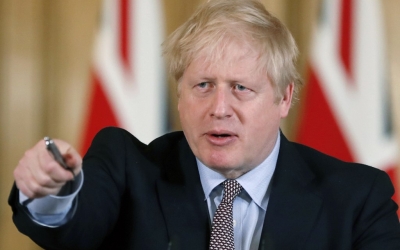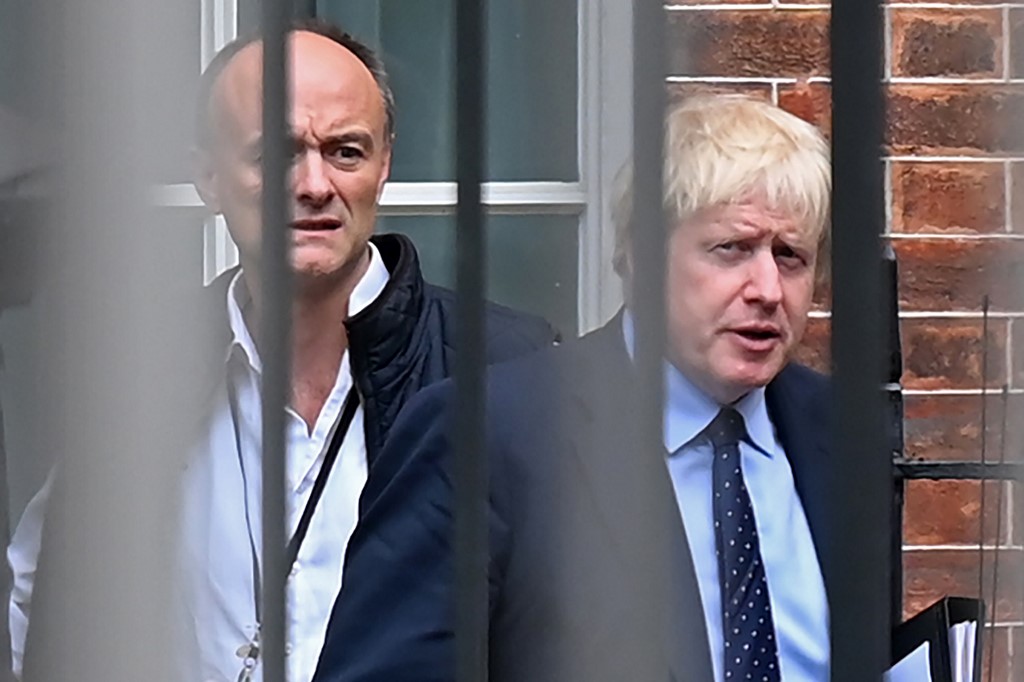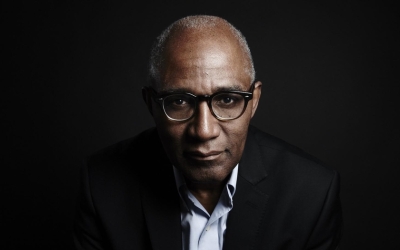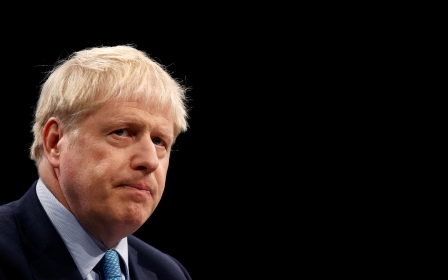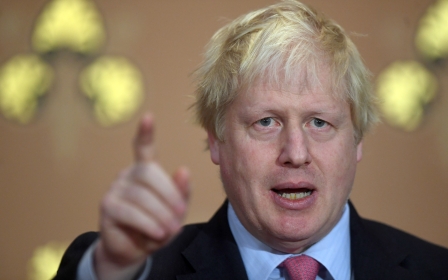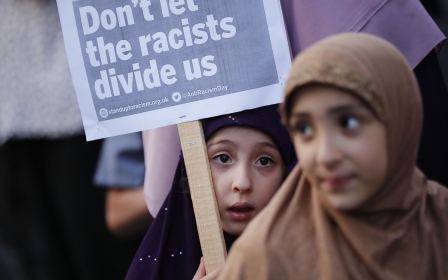Tory Islamophobia: The UK equality watchdog is letting the party off the hook
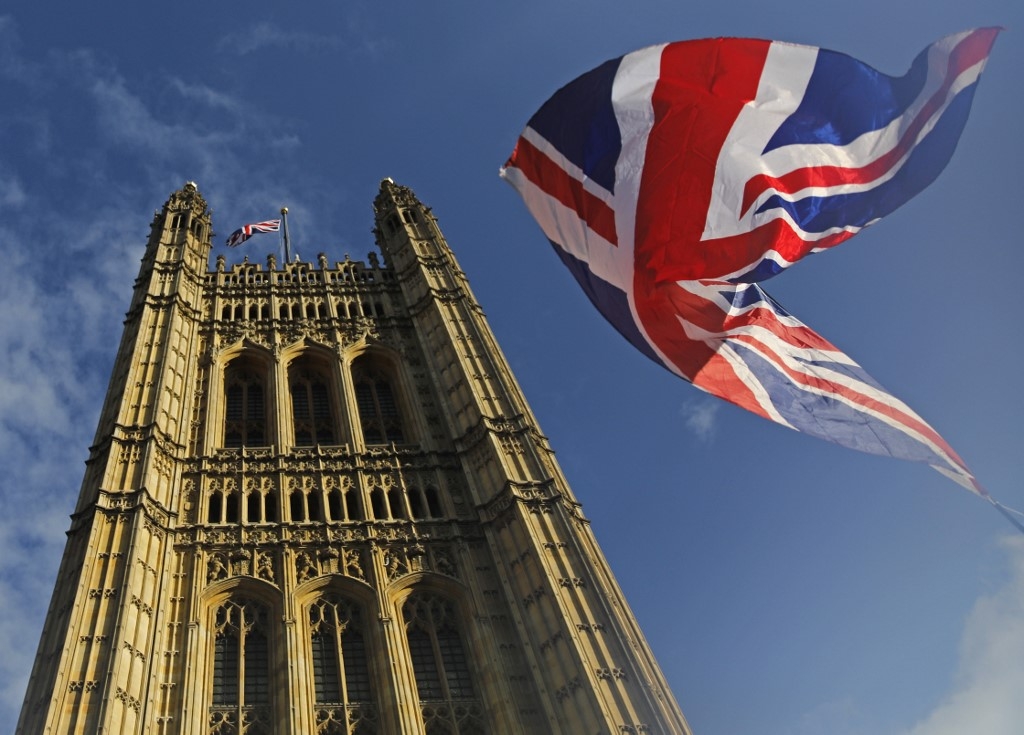
All four years of Jeremy Corbyn’s doomed leadership of the UK Labour Party were marred by serious accusations of antisemitism. These made headlines, and there is no question that the issue played a significant role in Labour’s crushing election defeat last December.
Yet, throughout this period, the Conservative Party had its own very serious problem of Islamophobia. Indeed, the views about Islam held by many Conservative Party members are shocking.
The issue dates back to David Cameron’s leadership and the London mayoral election of 2016. Notoriously, the Tories pumped out a constant barrage of propaganda portraying Labour candidate Sadiq Khan as the pawn of sinister Islamist forces.
Systemic Islamophobia
Worryingly, this policy came from the very top. In a shameful episode, Cameron, who was then prime minister, abused his position to falsely accuse an entirely innocent South London imam of being a “supporter of IS [Islamic State]” in a bid to link Labour to extremism. This smear was repeated by other senior Tories, and eventually apologies had to be issued and damages paid.
Numerous Tory MPs have expressed Islamophobic views before and since. Bob Blackman, MP for Harrow East, expressed regret after sharing an anti-Muslim post by Tommy Robinson. He also hosted events with anti-Muslim Hindu nationalist Tapan Ghosh, who has previously called for the UN to control the birth rate of Muslims and praised the genocide of Rohingya Muslims.
Islamophobic attitudes are structurally embedded within the Conservative Party membership on a scale that dwarfs Labour's problem
As for ordinary party members, I am afraid the problem beggars belief. A YouGov poll last year unveiled the chilling finding that two-thirds of Tory members believed parts of Britain operated under sharia law. Almost half believed in the myth of no-go zones where “non-Muslims are not able to enter”, while 39 percent thought Islamist terror attacks “reflected widespread hostility to Britain among the Muslim community”.
In other words, Islamophobic attitudes are structurally embedded within the Conservative Party membership on a scale that dwarfs Labour’s problem.
Even the most senior Tories have made Islamophobic remarks. Before he was elected prime minister, Boris Johnson compared women who wear the niqab to “letterboxes” and “bank robbers”.
His most senior adviser, Dominic Cummings, reportedly had overall responsibility for The Spectator website in 2006, according to Stuart Reid, the magazine’s acting editor at the time, when a controversial cartoon of the Prophet Muhammad with a bomb in his turban was posted on the site.
Media bigotry
And yet, this deep-rooted Tory bigotry has never received more than a tiny fraction of the coverage that Labour antisemitism has been given in the mass media. It doesn’t take a genius to divine the reason. Much of the media was passionately anti-Corbyn, and all too happy to use antisemitism as a stick with which to beat the former Labour leader.
Just as importantly, many British newspapers share and actively promote the same Islamophobic attitudes that are rampant in the Tory party. It is a strongly held view held by too much of Fleet Street that Islamophobia is a myth fabricated by Muslim activists.
Melanie Phillips in The Times writes that claims of Islamophobia are “used to silence legitimate criticism of the Muslim world”. Rod Liddle accepts that it exists; writing in the Spectator, he notes that “my own view is that there is not nearly enough Islamophobia within the Tory party”. This kind of bigotry is as rampant among right-wing journalists as it is in the Tory party.
This brings me to this week’s decision by the Equality and Human Rights Commission (EHRC), which is supposed to be an impartial umpire in British society, identifying and tackling unfair discrimination in our society.
The equalities watchdog opened its investigation into Labour antisemitism in May 2019, with results expected to be published this summer. By contrast, it has been extremely slow to take evidence of Tory Islamophobia seriously.
Policy of inertia
The Muslim Council of Britain and other Muslim organisations have been calling for an inquiry into Islamophobia for ages. But this week, the commission announced that it planned to continue its policy of inertia.
After the Conservatives published the terms of reference for their own independent inquiry, the EHRC concluded “it would not be proportionate to initiate our own investigation at this stage”.
Fair enough, many will say. They will reasonably feel it is right that the EHRC should give the Conservative Party a chance to sort itself out before mounting an investigation.
I disagree. The problem is that the Tory investigation focuses almost solely on the complaints procedure. I agree that the complaints procedure is a shambles and badly needs investigation, but it is the least of the Tory problems when it comes to Islamophobia - and it looks to me that many serious issues are outside the Conservative terms of reference.
Will Johnson’s Islamophobic remarks be taken into account? Not likely. What about the poisonous Tory campaign against Khan in 2016? Don’t think so. The structural anti-Muslim bigotry among Tory members and too many MPs? Doesn’t look like it.
That’s because the terms of reference appear to completely ignore the poisonous culture of structural Islamophobia that has become firmly established inside the Tory party.
Narrow remit
When I put this point to the Conservative Party this week, I got no response to my email, and repeated telephone calls went unanswered. So I approached the EHRC, where at least the call was courteously answered and emails promptly returned.
I expressed my concern that the Conservative Party investigation focused too specifically on the complaints procedure and ignored the very serious wider issues of Tory Islamophobia. I suggested that the EHRC was therefore making a serious mistake by not questioning the Conservative Party’s very narrow remit, given that this was its explicit reason for not compiling its own investigation.
That raises very troubling questions about the commitment to impartiality and fairness of an organisation that ought to deal with all parties in the same evenhanded way
The only response I received from the EHRC was to be pointed in the direction of its earlier statement, which did not answer my questions.
There are also concerns about the Tories’ choice of chairman for the inquiry, Professor Swaran Singh. Singh, a psychiatrist of Sikh heritage, has written eloquently about the issues of racism that he encountered when he first came to Britain nearly 30 years ago.
But questions have been raised over an article written by Singh in Spiked Online, whose editor Brendan O’Neill has said: “Islamophobia is a recently invented term that is mainly designed to shut down critical discussion about Islam.”
Of course Singh should not be held to account for O’Neill’s comment. But suppose Corbyn had appointed as chairman of Labour’s antisemitism inquiry someone who wrote for a fringe magazine whose editor thought antisemitism was an invented term whose purpose was to shut down discussion. It does not require a great deal of imagination to conjure up the colossal public row that would have resulted.
Special treatment for Tories?
This brings me to the biggest problem of all. Islamophobia appears in quotation marks in the Tory party inquiry's terms of reference. This suggests that the Tories are flirting with the same idea as O’Neill and Phillips - namely that Islamophobia doesn’t really exist.
I raised this issue, not once, not twice, but three times, with the EHRC; no response. It's hard to avoid the conclusion that the EHRC has shown less willingness and been slower to respond to allegations of Islamophobia within the Tory party than those of antisemitism within Labour.
The EHRC is built around a beautiful idea. Established in 2006, it says it seeks to build on Britain’s “long history of upholding people’s rights, valuing diversity and challenging intolerance”.
I am afraid that the evidence suggests that Labour intolerance matters more than Tory intolerance when it comes to the EHRC. That raises very troubling questions about the commitment to impartiality and fairness of an organisation that ought to deal with all parties in the same evenhanded way.
I’m starting to wonder whether the EHRC plays straight with Muslims. And I am also starting to wonder whether it offers special treatment to the Conservative Party.
The views expressed in this article belong to the author and do not necessarily reflect the editorial policy of Middle East Eye.
Middle East Eye propose une couverture et une analyse indépendantes et incomparables du Moyen-Orient, de l’Afrique du Nord et d’autres régions du monde. Pour en savoir plus sur la reprise de ce contenu et les frais qui s’appliquent, veuillez remplir ce formulaire [en anglais]. Pour en savoir plus sur MEE, cliquez ici [en anglais].



